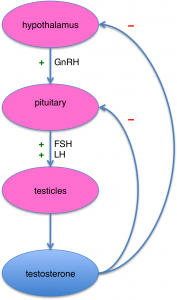How much testosterone do you lose?
How much testosterone are you losing?
And what can you do about it?
We all know testosterone is important, but how important? And what exactly is testosterone?
Testosterone is a steroid hormone involved in sexual and reproductive development and is found in both men and women. In men, it is produced in the testes (in women, the ovaries) and production is controlled by the hypothalamus and pituitary gland found in the brain. Production of testosterone in a woman is about a tenth or twentieth of that produced in a man.
Testosterone is involved in the development of the following:
- Male sex organs
- Sex drive
- Growth of facial and body hair
- Fat distribution
- Muscle mass and strength
- Bone strength
- Mood and energy [Mayoclinic.com]
What are some of the symptoms of low testosterone?
As our testosterone level declines we may experience a variety of symptoms. For example:
Changes in sexual performance
- Reduced sexual desire/ ability
- Fewer erections
- Infertility
Changes with our physical body
- Increase in body fat (especially in the abdominal area = POT BELLY)
- Reduction of muscle mass and overall strength
- Lower metabolism and energy
- Decrease in bone density
- Hair loss
- Height loss
- Hot flashes
Changes in sleep patterns
- Insomnia or other disturbances
Psychological and Emotional changes
- With a decrease in energy, men with lower testosterone may also feel less motivated which can diminish self confidence
- Feelings of depression may follow
Other changes can include difficulty concentrating and remembering things, and a decline in overall mental acuteness.[1] None of which sound appealing or enjoyable.
Now for the big question: HOW do we lose testosterone?
After about the age of 30, men typically lose about 1% – 2% of their testosterone level each year. This is considered a natural part of aging. There are, however, things that contribute to lowering our testosterone which ARE in our control to change.
There are things that we do (or lifestyles that we lead) that increase the rate at which our testosterone level drops. For example, a younger man may experience Low T (Low Testosterone) if he is overweight. Obesity can increase the risk of low testosterone (which in turn makes it more difficult to lose weight). In fact, there is a relationship between the size of a man’s waist circumference (being larger) and lower T levels.[2]
Excessive use of alcohol is another factor that negatively effects testosterone levels. The more you booze, the more you lose.
Other things such as side effects from medications, thyroid problems or depression can also play a role in testosterone decline. If you think you may suffer from low testosterone, consult with you doctor.
NEW RESEARCH
Now for the even bigger questions: What can we do to slow or stop the loss of testosterone? Or conversely, is there anything we can do to increase our testosterone level?
Testosterone levels between 300 ng/dL (nano grams per deciliter) and 1000 ng/dL are considered in the healthy range (keeping in mind that our testosterone levels change throughout the day so you may have one reading in the morning and a different reading in the evening).
Here are some suggestions for naturally increasing testosterone levels:
- Watch your weight. If you are overweight, lose it. The bigger you are the less T you likely have.
- Exercise. This can maintain and improve testosterone levels. Some experts say to focus more on weightlifting (with less time between reps) and less on cardio.
- Get your sleep. Eight hours of sleep is best. One study published in the Journal of the American Medical Association, “found that men who slept less than five hours a night for one week in a laboratory had significantly lower levels of testosterone than when they had a full night’s sleep”[3]

- Need another reason to got to bed? The next recommendation is: Have more sex (or at least more erections). The idea here is more sex = more testosterone. So have at it!
- Watch your alcohol intake. Excessive drinking negatively effects testosterone levels. This doesn’t mean you can’t drink, but it does meant that your drinking should be in moderation.
- Reduce stress. Cortisol is the hormone that is released into the body when we are stressed. When cortisol is released testosterone shuts down. This is how these 2 hormones function during a stressful situation. The problem is when we experience too much stress or prolonged stress our testosterone suffers. It is important to figure out ways to eliminate or reduce the stress in our lives. Read more about the effects of stress on testosterone levels.
- Supplementation. Dr. Shawn Talbott, PhD, LDN, FACSM, FACN, Nutritional Biochemist says that, “In addition to a balanced diet, certain dietary supplements are effective in naturally maintaining normal levels and balance of cortisol and testosterone. He recommends Eur
 ycoma longifolia (Tongkat ali) as “a safe and effective natural way to bring testosterone levels back to within normal ranges”….and is “probably the best first-line therapy.”[4,5]
ycoma longifolia (Tongkat ali) as “a safe and effective natural way to bring testosterone levels back to within normal ranges”….and is “probably the best first-line therapy.”[4,5]
Click here to learn more about Dr. Shawn Talbott.
To sum it all up, men need testosterone to maintain all of the things that are generally associated with being a man. There are a number of things that we can do to keep our testosterone level in normal range (and avoid the nasty side effects listed above). Exercise, eating right, and watching the stress in our lives are vital. However, supplementation can also play a pivotal role in keeping testosterone levels within normal range.
See All Natural Testosterone Boosters
[1] http://www.mayoclinic.com/health/testosterone-therapy/MC00030
[2] http://www.menshealth.com/weight-loss/improve-your-testosterone
[3] The University of Chicago Medicine Press Release (2011), http://www.uchospitals.edu/news/2011/20110531-sleep.html
[4] http://www.doctoroz.com/videos/improving-biochemical-balance-and-energy Improving Biochemical Balance and Energy, 12/20/11.
[5] Talbott, SM (2013). “Effect of Tongkat Ali on stress hormones and psychological mood state in moderately stressed subjects”. Journal of the International Society of Sports Nutrition, 10:28.


























